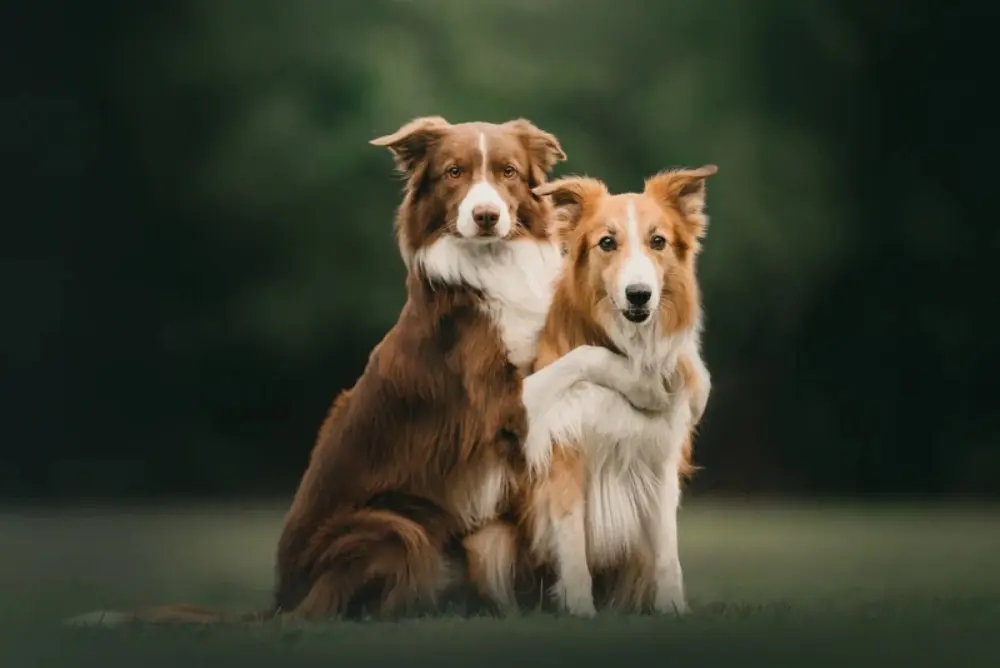What Happens to Bonded Dogs When One Dies?
- August 12, 2025
- Celebrations of Life

When two dogs share a profound bond, they become inseparable, often acting as companions, playmates, and even protectors for one another. These “bonded pairs” can experience severe distress when one dog passes away. Understanding what happens to bonded dogs when one dies is crucial for pet owners. It allows us to provide the surviving pet with the care, attention, and comfort they need during this difficult time.
Whether you’re dealing with the loss of a pet or preparing for it, knowing how to support a grieving dog can make a difference. This is where Pet Memorials play an essential role in honoring the memory of your lost companion while supporting the surviving dog through their grief.
Understanding the Bond Between Dogs
Before we dive into what happens when one dog dies, it’s important to understand the bond that forms between two dogs. Bonded dogs develop a close relationship that goes beyond simple friendship. These bonds are often seen in dogs that are siblings or have grown up together, though they can also form between unrelated dogs.
Dogs are social animals by nature, and a strong bond provides comfort, security, and companionship. The relationship between bonded dogs can resemble the emotional ties we humans share with loved ones. When one member of the pair passes away, the surviving dog may exhibit a range of emotional and physical responses.
The Grieving Process for Dogs
Just like humans, dogs can experience grief after losing a companion. The intensity of their mourning can vary depending on the strength of the bond they shared. While not all dogs will exhibit noticeable grief, many will display changes in behavior after the death of a bonded companion.
Here are some signs that your surviving dog may be grieving:
- Lethargy: A once energetic dog may become listless or seem uninterested in activities they used to enjoy.
- Loss of Appetite: Grief can lead to a decreased appetite or even refusal to eat.
- Separation Anxiety: Dogs that were used to having their companion around might develop anxiety when left alone.
- Excessive Sleeping: Some dogs may sleep more than usual as they cope with the absence of their companion.
- Vocalizations: Whining, howling, or barking excessively can be signs that a dog is mourning.
It’s important to recognize these behaviors as signs of grief rather than just changes in routine. If your dog continues to show these signs for an extended period, it’s a good idea to consult with your vet to rule out any underlying health issues.
How to Help a Dog Cope with Loss
Helping a dog through the grieving process involves a combination of emotional support, physical care, and routine adjustments. Here are some strategies to help your dog cope with the loss of a bonded companion:
- Maintain a Routine: Dogs thrive on routine, so keeping a consistent daily schedule can provide them with a sense of security during a time of change.
- Spend Quality Time Together: Offering extra affection, attention, and reassurance can go a long way in comforting your dog. Spending more time together can alleviate feelings of loneliness.
- Provide Mental and Physical Stimulation: Keeping your dog engaged through play, training, or even new experiences can help distract them from their grief and prevent depressive behaviors.
- Consider Pet Memorials: Honoring the memory of the deceased pet can provide closure for both you and the surviving dog. Creating a Pet Memorial in your home can be a beautiful way to commemorate the life of the lost dog. You can explore different ways to remember your pet by visiting our Pet Memorials page.
- Introduce New Experiences Gradually: If you plan to bring a new dog into the family, do so slowly. Your grieving dog will need time to adjust to their absence before fully welcoming another pet into the home.
- Seek Professional Help: In some cases, your dog’s grief may require the guidance of a professional, such as a veterinarian or an animal behaviorist. These experts can offer advice on easing your dog’s transition after the loss.
Should You Get Another Dog?
One common question that arises when a bonded dog dies is whether or not to adopt another dog to fill the void. While it may seem like a quick fix, it’s crucial to consider whether your surviving dog is ready for a new companion.
Some dogs may not be emotionally prepared for the change and could react negatively to the introduction of a new pet. Before making a decision, assess your dog’s behavior and readiness. A waiting period allows your dog to heal emotionally before adjusting to a new dynamic.
Honoring the Memory of Your Lost Pet
One meaningful way to help both yourself and your surviving dog cope with the loss is by creating a memorial for the pet that passed away. Pet Memorials are a touching tribute to your dog’s life and can help preserve their memory for years to come. You can create a dedicated space in your home with your dog’s favorite toys, photos, and mementos.
Additionally, consider submitting an obituary to commemorate the life of your beloved pet. Sharing your pet’s story and memories with others can be a cathartic process and can also provide solace to others who are going through a similar experience. You can submit an obituary on our Submit an Obituary page, where pet owners can honor the lives of their lost companions.
How Pet Memorials Can Help Surviving Pets
Creating a Pet Memorial not only serves as a loving tribute but can also benefit the surviving dog. Dogs are sensitive to changes in their environment, and a physical reminder of their companion may provide comfort. Incorporating elements from your deceased pet’s life into the memorial, like their blanket or bed, can offer your surviving dog a sense of familiarity and security.
For more ideas on how to create a meaningful memorial for your pet, explore our Pet Funerals and Memorials section.
Conclusion
Losing a bonded dog can be devastating, both for the owner and the surviving dog. Understanding the grieving process and offering the right support can make this transition smoother. Whether through creating a pet memorial, maintaining routines, or seeking professional advice, there are many ways to help your dog navigate their grief.
Remember, you are not alone in this journey. Honor your pet’s life by considering a Pet Memorial, and if you feel moved to do so, submit an obituary to share your pet’s story with others who understand the deep bond shared between pets and their owners.
FAQ Section
How long do dogs grieve the loss of a bonded companion?
The length of grief varies depending on the individual dog. Some may recover in a few weeks, while others could take months to adjust.
Can dogs get depressed after losing another dog?
Yes, dogs can experience symptoms of depression after losing a companion, such as lethargy, loss of appetite, and decreased interest in activities.
Should I get another dog after one of my bonded dogs dies?
It’s important to assess whether your surviving dog is emotionally ready for a new companion. Take time before introducing another dog to avoid overwhelming your grieving pet.
Related Articles

What Happens to Bonded Cats When One Dies?
- August 30, 2025
- Celebrations of Life

What Kind of Behavior Does a Dog Exhibit Before Death?
- August 8, 2025
- Planning
Search Articles
Sign Up For Our
Newsletter
Stay up to date on resources to help you prepare.


